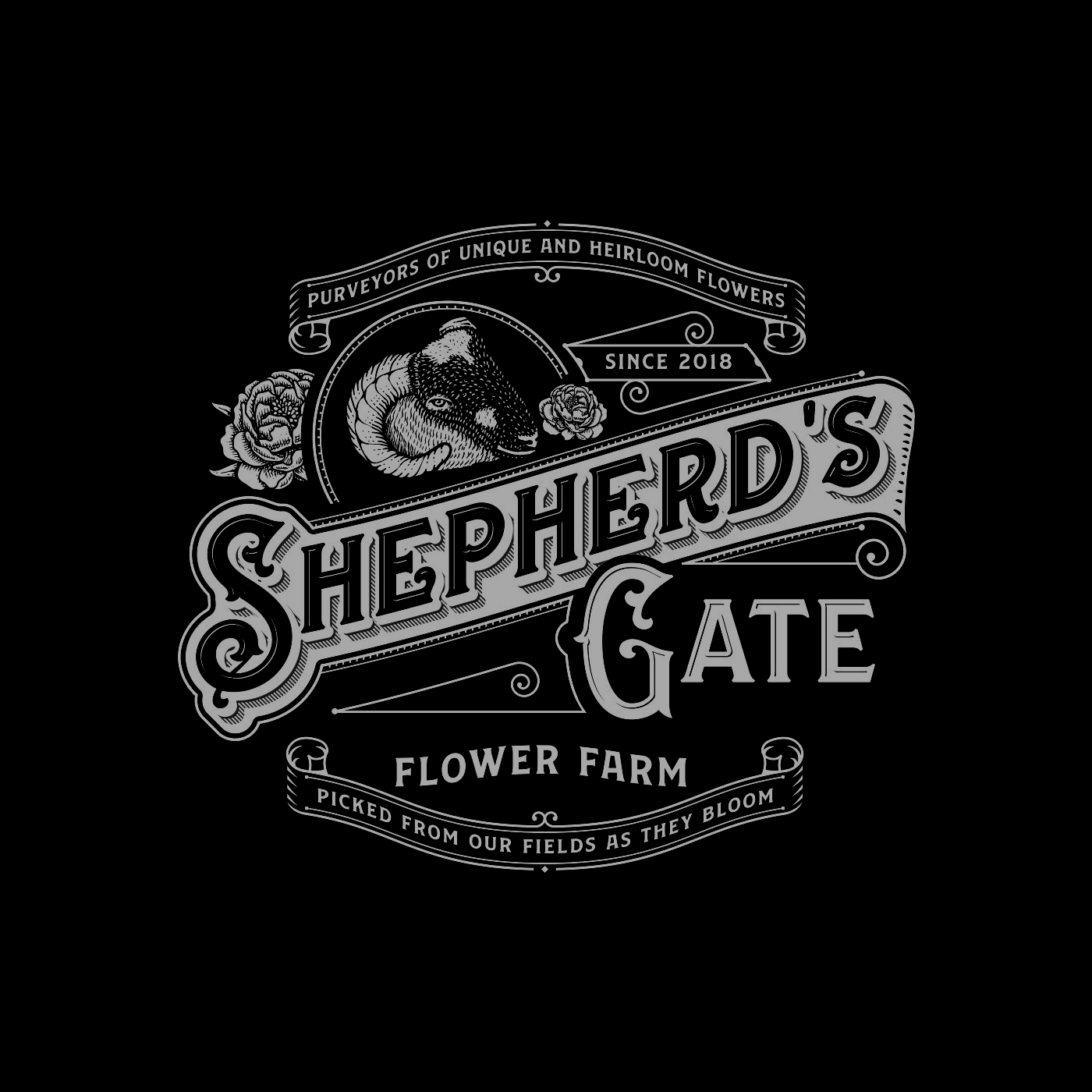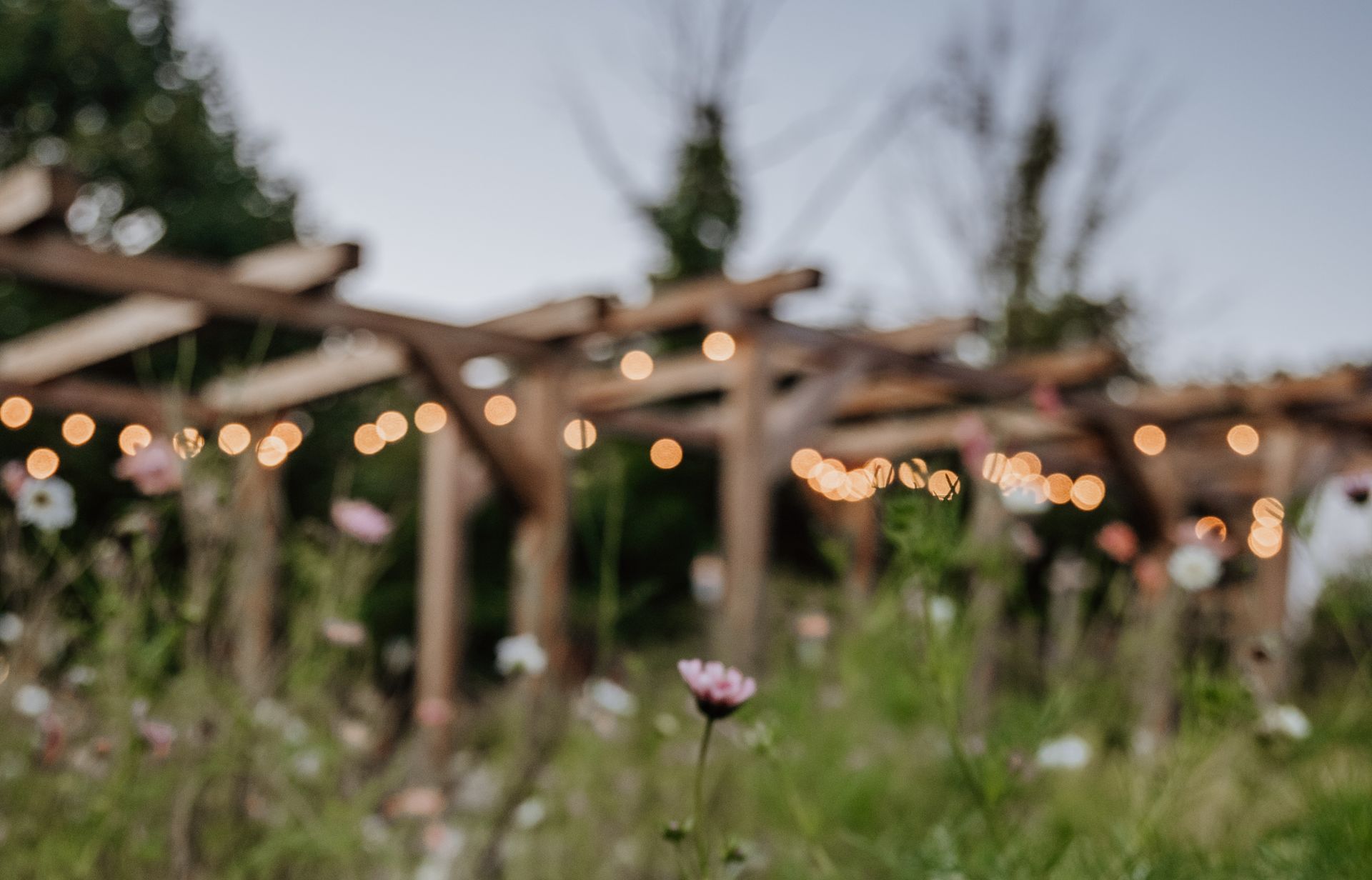2022 Year End Reflection
Christopher Kane • January 1, 2023
For us, 2022 will go into our memories as a year of challenges.
As we put the year behind us and reflect on all that has happened - and it’s been a LOT - we remember how this was a year of great struggles and many blessings.
It was a year of health challenges. If I am to believe the news - and I make it a point not to believe everything I hear - I am sure many of you faced health challenges in 2022 as well. For us, we seemed to begin the year embattled. The year started with Covid, that dreaded bug that struck everyone in the family. Then, just as we seemed to be getting better, there was a cold or flu that just wouldn’t go away. Luckily, these weren’t at “customer facing” times, but they did strike right in the heat of seed starting season. Further, in April, I was diagnosed with a hernia and ended up going in for surgery. The good news was that I had a great team of doctors, and they got me in very quickly. The challenge was that this meant I was out of commission for about 8 weeks during both planting season and the beginning of flower sales. However, just when things were starting to look bleak, we had a number of friends, neighbors, and some from our church family who volunteered their time to make certain tasks and plantings got done. Wow! During this time, we were reminded of the great power of having a community of people rally around you - and we are still very grateful!
A look around while out shopping during the course of the year no doubt revealed shop windows full of “Help Wanted” signs, perhaps even the occasional closure or lack of services due to a shortage of manpower, and believe it or not, we were no different. We spent most of our time this year in search of help. In 2021, we had a great team of volunteers and workers here on the farm to help keep things running smoothly. 2022 was a bit more of a struggle, however, and we spent the vast majority of the season running on half the staff we truly needed. I think that only YOU will truly be able to confirm this, but our hope was that it went mostly unnoticed by our customers and supporters - even with the occasional Saturday closure of the boutique. For us, however, it meant very early mornings, late nights, and long days, much of the time spending energy on just what was most important for that particular day to make sure things kept running and nothing died - perhaps a bit hyperbolic sounding, but true none-the-less. Still, with the staff we did
have, we were blessed. Much of the time, it meant having people that only lasted for a day here, a week there, or perhaps a couple of months if we were lucky, but we counted our blessings with each of them. Then, as we were getting ready to wrap up the season, an answer to prayers suddenly appeared, and we hired a farm manager - our first non-seasonal position! She was the perfect fit, and we are very excited about what she brings to the farm in skill, experience, and personality.
We began the year with a series of challenges, and so we also ended with a challenge - a storm to be exact. Just a few days before Christmas, the whole country braced for what some called a once in a lifetime storm. As the storm neared, we did what storm prep we could, and once it hit, we hunkered down with puzzles, games, and not a few prayers that all would be OK. That day, two very large trees came down in the rain and wind, one of which landed square on the barn roof just above the floral boutique. Even so, we still felt protected. The tree that hit the barn fell gently against the roof. Then, when thunderstorms hit that night, it slid down along the roof line taking out roofing tiles and gutters, and landed on some animal fencing just outside. Still, we count blessings with this one as well. A tree this size could have easily gone through the roof or the barn wall, but it didn’t. Sure, we’ll be working with contractors and insurance for a bit, but it could have been worse, and a couple less trees in that area means more sun - right?!
So those are a few of the challenges that really stick out. Sure, I could probably list more, but let’s not dwell. Instead, we choose to remember the blessings over the year: those who appeared to help out when we needed it, the employees we were blessed to have, the partnerships we’ve formed with other people and businesses in the area, the outpouring of “thank you’s” and well wishes from people with whom we came into contact over the season, the new and returning customers who always brought so many greetings and smiles, the many who signed up for classes and workshops, the members who brought us so much encouragement, the great joy we received from serving new couples and their wedding guests, the fun excursions we made while delivering flowers or completing floral installations all over New England, and of course the lessons we learned along the way.
…and that’s really what it’s all about, right? Enjoying the ride and learning from the bumps along the way.
Yes. We will remember 2022 as a year of challenges, but we will also remember it as a year of blessing.
We’re praying that 2023 brings health and joy, both for our family and yours.
Happy New Year!
Shepherd’s Gate Flower Farm
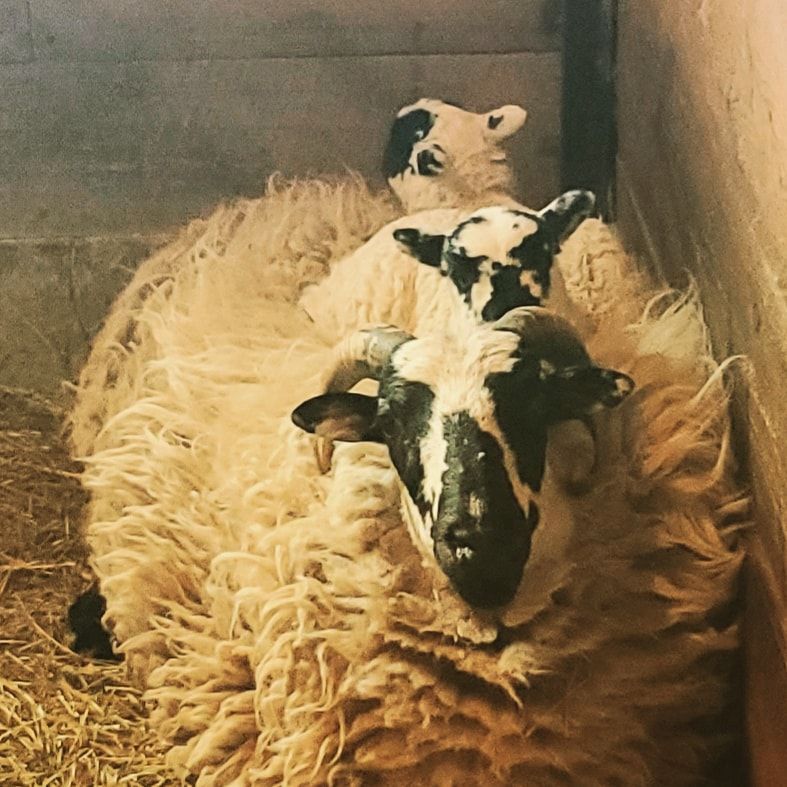
Where would we be without our beloved little flock of Scottish Blackface sheep?! The Scottish Blackface are an old breed common in the United Kingdom, but not so often seen in the USA. They are famous for their hardiness, long off-white wool, and black faces. Two of our current flock were with us at the dawn of this little farm, and they have played an integral, albeit behind the scenes role, ever since. Definitely, without them, the flower farm wouldn't be as far along as it is, and we certainly would be lacking in our cuteness quota! These sheep are responsible for a lot of the clearing that had to be done early in our development so that we could create the garden beds and fields that we have. Our current flock of five sheep are moved throughout available pasture space during the course of the year. This is called rotational grazing . They keep areas of weedy meadow and untamed briar patches mowed down as they eat and trample through thick swaths of whatever they find. They can even be occasionally found on wide patches of lawn or under our small orchard trees (plucking up fallen fruit before it rots upon the ground). Not only does this keep the grounds looking nice, it’s that much less time that we need to spend taking care of those issues ourselves! These are spoiled sheep! Pets, really. They stay in the barn at night, and when we clean out their stalls, we are able to use the hay as both a fertilizer and mulch in our beds and fields. Many of the flowers that we grow deeply enjoy the boost of nutrients that they get from the “sheep treated” hay! For all the time they save us in the field, it does take work to keep them as spoiled as they are. Their wool must be sheared each year, their hooves need regular trimming, and we need to make sure they always have access to water, food, and any nutritional supplementation that might be needed. Our hearts are broken if any of them are sick, hurt, or if they die despite our best efforts to care for them. But we are also full of joy and delight if we have a spring with new baby lambs! We love new life on the farm. C’mon! Is there anything cuter than young lambs running and leaping in a paddock?! (A quick piece of trivia: Have you noticed our logo? The sheep so prominently featured within it is none other than our “mascot”, Clayton, at about 2 years of age!)
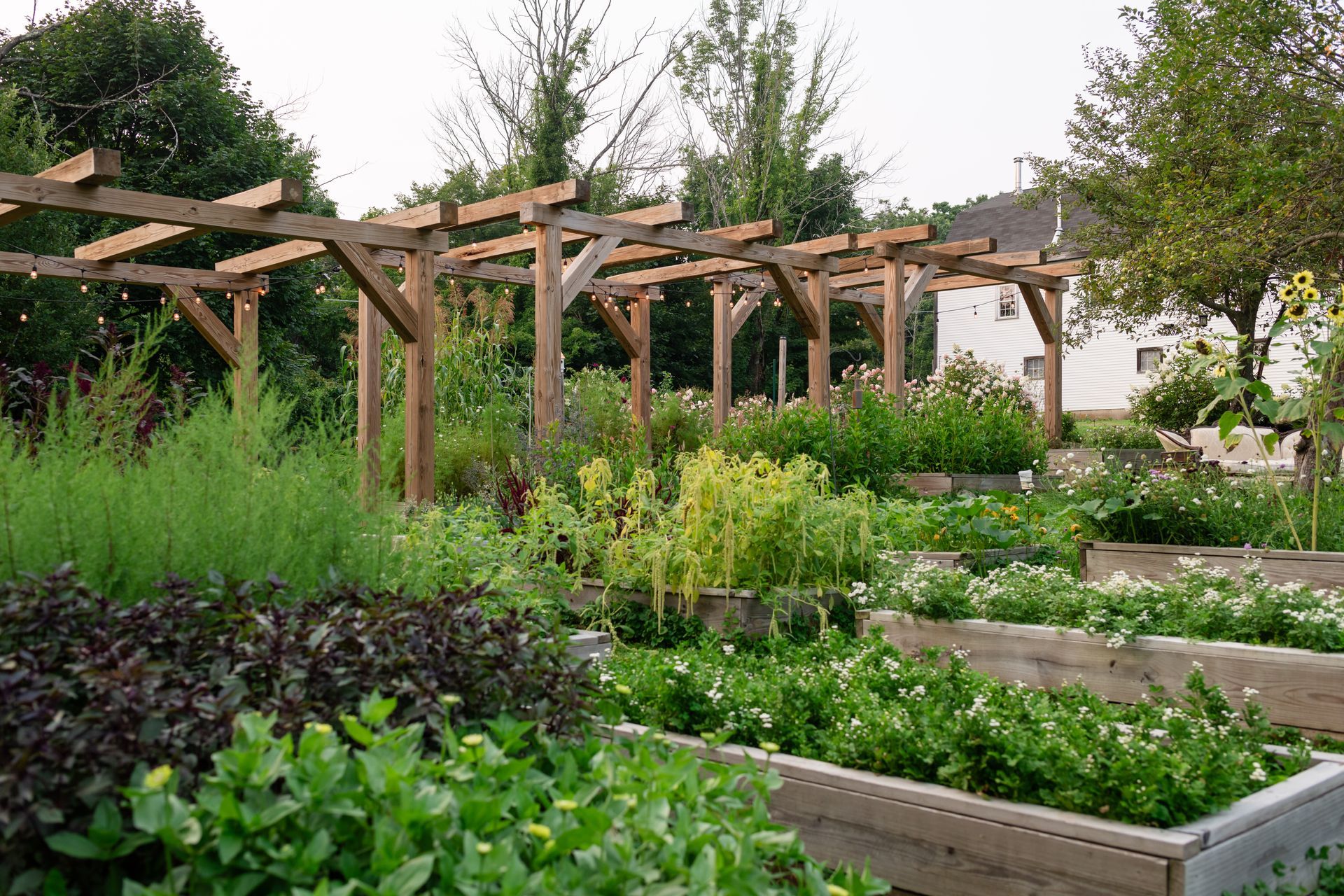
Let’s see… if you’re following us, then you probably love flowers. Further, like us, you may love to grow them, too! And, at this point in the season it can be really hard work. The weather is hot, the weeds seem more eager to grow than the flowers, the pests are HUNGRY, and you might be noticing that some of your plants seem to be “giving up” and succumbing to anything from too much heat to too much rain. Other issues might include not getting enough sun, some form of powdery mildew, or any other thing that you could think of (or maybe couldn't have possibly fathomed until - BOOM - it happened)! It can feel overwhelming, right?! Take heart! We believe that gardening is good work, that cultivating beauty is important, and that we can learn so much about life from tending to these lovely plants. And we encourage you to keep tending those gardens. Stay the course! One way we do our best to stay on top of it all is by being hypervigilant throughout the season. Every day, we walk the fields, keeping our eyes open for any potential problems. By daily laying our eyes on each area of the farm, we can see problems arising and issues that might need to be addressed. This includes which beds need the most weeding or deadheading, where pest problems might be cropping up, and whether the plants seem to be growing as we have expected (or perhaps need a bit of extra help). Our suggestion for those who might ask? Don’t let the tasks of the season bog you down. Observe closely the life that is happening in your garden so that you can catch problems early on, but also make sure to take the time to fully enjoy it all. Remember that gardens, like life, aren't perfect, and that gardening is often a lesson in "letting go". Yes. Be vigilant. But also take any moment you can to relish the fruit of your labor: pick the flowers, enjoy the tomatoes, or simply sit and breathe in the serenity of your garden. Lastly, consider how you could build community by sharing from your abundance with someone you love, whether family, a neighbor, or friend. Gardens can have a way of bringing people together. Speaking of which, the next time you’re in our area, we invite you to check us out. We love sharing our gardens, and our flowers, with our customers, friends, and community.

In a recent Instagram post, we talked briefly about concerns with the overuse of chemical pesticides and fungicides that can occur in large scale flower farming. In this post, we will talk a little bit more about how we do our best here to prevent and address pest issues on our small, family farm. For pest management, we always prefer natural insect controls and traps to harsh chemical pesticides and fungicides. We try to be as natural as possible while being open-minded about potential resources to treat pests and other issues. By far, the least toxic method for dealing with most insect pests is to do a careful inspection of the plants from the soil all the way up the stem, underneath the leaves, and all over the buds and blossoms. While doing this inspection, we collect any undesirable pests along the way and either squish them or add them to a solution of soapy water. This is our “picking method”. One of the most destructive pests here on our farm in mid summer is the Japanese beetle. They are particularly hard on the rose plants, and it is discouraging to work hard at nurturing these plants just to have them chewed up and their blooms destroyed before we can get to a harvest. In the past, this method was our “go to”. However, in recent seasons, beetle pressure increased to alarming levels. So, last season, we brought in Japanese beetle traps - and found that they helped. We had avoided traps until then, but they caused such massive damage during the prior season that we nearly lost our entire rose crop. They were everywhere, and we just couldn’t keep up with picking them off by hand. Although we continue to research and test other methods, since the introduction of traps, we have noticed a big difference. We even enjoyed one of our best rose crops ever this year! If pest pressure is at its worst from caterpillars and worms, we may spray with a mix of bacillus thuringiensis (BT) and dish soap, but application is very specific to where it’s needed. We only do this if we see a severe infestation, making it easier to target the insects we are actually having a problem with. For an infestation of sucking insects, our first choice is to diligently crush them by hand, disrupt their cycles with strong blasts of water, or release natural predators. We may even use an applicator to mist “infected” plants with a mixture of soap and water. In severe cases, or if other methods are not working properly, we may turn to the careful application of a commercial insecticidal soap. However, as noted, our choice for the management of pest issues is to stay as natural as possible and minimize negative effects to the surrounding environment. This can make for harder work sometimes, but we feel strongly about protecting the safety of our families, pets, and other plant and animal species that come into contact with our farm. Additionally, there are many beneficial insects that spend their lives in our flower beds and fields (a matter-of-fact, we plant and nurture spaces just for them), so minimizing any harm to these “little partners” is also important! All-in-all, we believe that the best pest management strategy finds its foundation in the health of our soil and plants. To this end, we take great care in building up and nurturing healthy soil and making every effort to ensure that our plants are receiving proper light, water, and nutrients so that they grow big and strong. We hope that you find this information interesting and perhaps even inspirational. If you have any questions about how we care for and manage our growing spaces, particularly as it comes to pests, we encourage you to book a private tour or keep your eyes open for one of our spring gardening classes. Have a beautiful day!
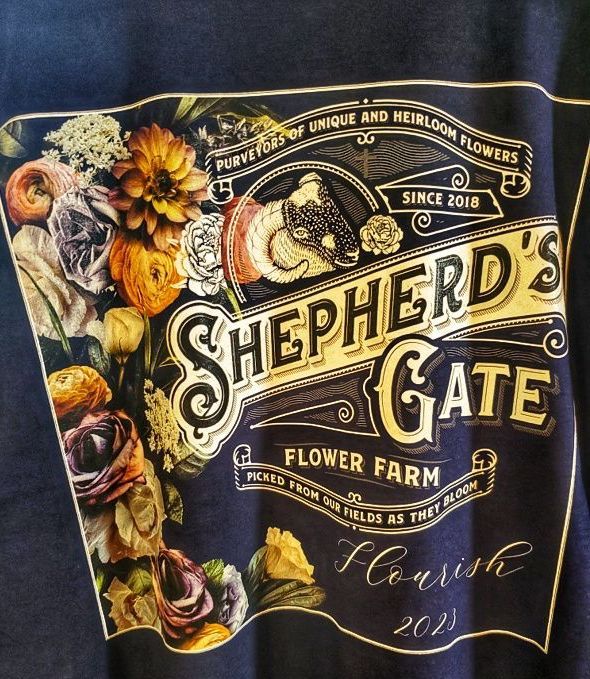
I usually start the new year with a reflection of the season gone by that I post in January. However, January was a very busy month for us - all in good ways - and so this reflection is getting out later than expected. Please forgive me. Overall, 2023 was a good year. We’ve started choosing a focal word for each of our growing seasons, and the term we rallied ourselves around last year was flourish . I think it was a good description of how the season went - the flowers flourished, the farm flourished, and we flourished. One surprise was… the weather! No doubt about it; it was a wet season! As might be expected, with the rain came both benefits and challenges. I have to say that we were definitely blessed to be able to report very little loss due to the wet weather. (Something many of our brothers and sisters in the farming community might not have been able to report. Our hearts go out to them.) Probably the biggest impact early in the season was on our tulips. We lost about 7/8ths of that crop! Ouch! But another unexpected impact came from the copious amounts of cloud cover. As spring progressed, many of our flowers grew taller and fuller, even became loaded with blooms, but just wouldn’t open. They sat and sat, looking up at the cloudy sky, waiting for the warm energy of a sunny day, but that came much later than expected. Finally, the sun and sky began to show, and soon so did our flowers… and we breathed a great sigh of relief! In contrast to the challenges we faced, and under the column of “benefits”, was that almost no supplemental watering was needed this year! Hallelujah! Combine all that rain water with a program of natural fertilizing and soil building that we try to follow here on the farm, and we had unprecedented health and vigor in our perennials, trees, and flowering shrubs. Even most pests seemed to be kept at bay. We loved it! Another very special part of the 2023 season was the customers! Whether they were here for an event, a class, or simply to browse the boutique, it always fuels our spirits to welcome new and returning faces. There’s just something about flowers, a walk in the gardens, or pursuing the rustic beauty of the shop that seems to bring a smile to people’s faces - and get them talking! That’s actually a LOT of fun for us - getting to know our customers, hearing about their lives, and sharing dreams and ideas. What a blessing you all were. Thank you! As mentioned earlier, “Flourish” was our word for 2023… and a period of flourishing was very welcome after the tiring challenges of 2022. It was like a breath of fresh air to see the fields growing lush and full (Did you see our dahlias in 2023?! WOW!!!), to welcome helping hands in the form of eager volunteers and returning staff, and to receive such an encouraging response to some of our new classes and events. Speaking of events, this year, the staff put on quite a beautiful spectacle with “Christmas in the Barn''. Held on Small Business Saturday, the barn was attractively decorated for Christmas, complete with multiple Christmas trees, and included sales and specials for the many who came to browse the nooks, crannies, and shelves of the boutique. We completed the night with a festive wreath making party where participants drank, snacked, and listened to holiday music while putting together some of the most beautiful wreaths I’ve seen for one of those events yet! It was amazing! And how could I go any further in talking about flourishing without mentioning that this was the first year in which we opened the grounds to those hoping to pick their own flowers. Rain or shine, and there were definitely some days in which it rained, customers for the PYO days went home with armloads of flowers and ear-to-ear smiles! Thank you to each of you who came out to make those days energetic and fun! Further, I’d be remiss if I didn’t mention weddings. We can still remember the first time so many years ago that a bride approached us to arrange the florals for her wedding - and the magic and honor we feel with each new wedding since then has never faded. Weddings have become some of our favorite activities - tiring for sure - but loads of fun! Melissa is a trained wedding planner and floral designer, and we loved how many of you allowed her to flex her creativity and skill in designing your florals, tables, and accents. We loved meeting friends, families, and of course, the couples ! We are honored that you chose us to help make memories on such a special day. Blessings to each of you! Lastly, this was a year of professional growth for us as well. Our farm manager celebrated her first full year with us, and we moved another of our seasonal employees to nonseasonal also. He’s been with us for a couple of years now, and so it feels good to say that we have a strong staff as we move into 2024. That’s certainly not discounting the seasonal staff and volunteers that helped us throughout the season. While many of them might have been new faces, many others were not. It’s so good to know that they wanted to come back, and we look forward to seeing them again this year too! Training was also a big part of the 2023 season. Melissa completed a very prestigious floral design course under both US and European designers and has been sharing much of that knowledge with her design staff. We’ve also been moving through some very interesting business strategy activities which have been helping us take a better look at our strengths and opportunities, so that we are better informed as we move into the years ahead. Look out, 2024; here we come! I could go on for pages with all of the highlights from the year… the hybridization and testing programs, the fun we had on picking tours, a volunteer day with Portsmouth Christian Academy, the photographers who visited, and on and on and on… but maybe I’ll save all those for another time. For now, just know that I have a smile on my face as I type this… as I look back at the 2023 season, and as I replay so many of those events, interactions, and conversations. Yes. It was a good year. It was a good year to flourish.
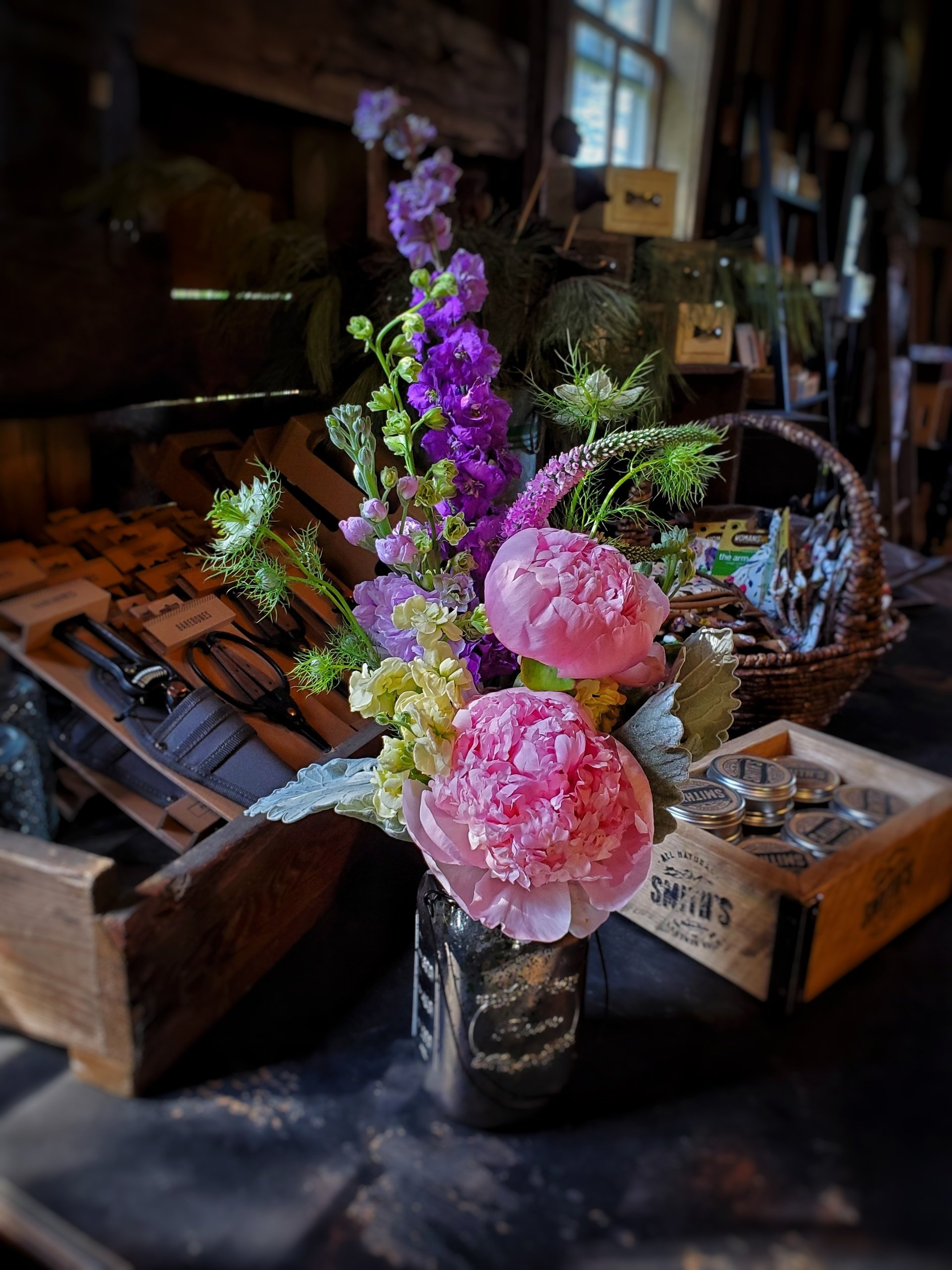
2022 Shepherd’s Gate Flower Farm Flower Shares are available now for purchase, but what is a flower share and why should you get one? Essentially, the Shepherd’s Gate Flower Share is a CSA. What’s a CSA? A CSA is an agricultural term that stands for C - community, S - supported, A - agriculture. It’s a model in which people from the local community (customers) buy into a farm’s harvest in advance of the season. Customers become farm members by agreeing to pay a predetermined amount in advance of the production season for products that have been outlined in the agreement. By supporting farms in this way, farm members provide much needed funds for small farms in advance of their harvest. They also free up farmers at an essential time in the farm calendar to switch their energy focus from marketing to strong land stewardship and fruitful production. Then, once the harvest season begins, customers reap the benefits of the farm’s support-energized focus. These farm members enjoy a connection to the farm, the farmers themselves, and even the land which they are supporting through their financial backing. As members, they are also often privy to specials, educational opportunities, and exclusive events. This is the model from which Shepherd’s Gate derives its flower share program. As outlined above, customers who buy a flower share become supporters of our farm, its workers, and the regenerative land stewardship that we practice. Additionally, as flower share members, supporters are investing in their community - the community in which we live, do business, and cultivate the land toward the goal of growing flowers and greens that will beautify the community and bless the lives of those to whom they go. So, how does a Shepherd’s Gate Flower Farm Flower Share work? Well, the first step is to buy a share. You can find a full listing of our four share levels in the online store on our website www.shepherdsgateflowers.com . Essentially, we have three seasonal, 6-week shares and one full season, 18-week share. Each week during the appropriate program schedule (the duration of the particular share), members receive an exceptional, handcrafted floral arrangement in a specialty vase. These arrangements, stylized by our own Floral Alchemist, are specially curated with our members in mind. They are different than any of the “grab and go” arrangements that you might be able to pickup from either The Porch or the boutique. (Their weekly value alone tends to run close to $45 or even $65 - a steal when you consider the average cost of a membership!) A 10% merchandise discount is also extended to our members. This discount may be used in the floral boutique for candles, logo gear, gardening supplies, and home decor. Lastly, floral share members receive special invites to workshops, tours, and other farm events. Already this year, our members have had the opportunity to apply a special discount toward the purchase of preseason seeds and tubers that will become available for pickup once the season gets underway. Other special opportunities for the 2022 season are in their planning stages, including what we hope will be a truly special opportunity for our seasonal grand opening in June. So, is a flower share right for you? I suppose it depends. On a broad level, supporting small farms in this manner encourages economic diversity, job growth, and for farms such as ours, sustainable land management practices. On a community level, supporting farms such as ours supports local jobs and supports the area businesses that we sell to and buy from. Hopefully, in the case of Shepherd’s Gate, it also helps to beautify your home or office, and provides a little extra joy for those to whom you give our flowers. It also hopefully brings a little extra wow-factor to local events (think weddings, recitals, etc) and some added comfort to those who are hurting (think bereavement flowers or flowers for someone not feeling well). As mentioned above, a Shepherd’s Gate Flower Share really pays for itself. In our case, you are buying your flowers directly from the source - flowers that are grown right here on our land. This cuts out a lot of middlemen and doesn’t require shipping, which keeps costs low - a benefit we pass directly to you. (In the case of our shares, you are receiving an arrangement which would normally go for at least $45 [on the low side] for only $25.) Because flowers and greens are grown here and harvested daily, you can be assured that your flowers are as fresh as possible. They have even been specially conditioned by our team to ensure longevity. (Flowers shipped to a local florist or grocery store are rarely shipped in water. They might also be stored for a day or longer in a holding facility… not to mention the time they spend on airplanes and/or trucks.) A matter-of-fact, that’s probably the second most frequent comment we get from our members and customers: “I can’t believe how long they lasted!” (The first comment is usually about how beautiful they are - everyone LOVES flowers!) If any of those things mean something to you, then a flower share might be for you. Lastly, we want to express to all of our customers and share members just how grateful we are for you! This is a labor of love for us - not a money maker. The wide eyes, the smiles, the gasps of joy, and the many notes, messages, and words of gratitude and encouragement that we receive from our members and customers fills our hearts to the brim. Thank you! The Shepherd’s Gate Flower Farm Note: If you have any questions about flower shares, please reach out to us.

As we turn the last, well-worn page of the 2021 calendar, my thoughts turn back to the year gone by, and if you have a moment, I’d love to share a few of these reflections with you. It seems so strange how quickly the year flickered by. It was barely 365 days ago that we sat at our dining room table (the best place, we find, to brainstorm and strategize all things “farm”). The seeds had been sorted, categorized, and logged. There were pens, markers, and Post-Its of various sizes and colors strewn about calendars, notebooks, and laptops. Dates were being scribbled, erased, and moved as we considered things such as “days to maturity”, bookings, and special requests. Certain ideas appeared frequently during these conversations: bringing more beauty and value to our customers, increasing the field production, and creating lasting memories for brides and loved ones. Our objectives were before us, and we prayerfully looked forward to the challenge. Then, all too suddenly, the season was upon us! Sure enough, we not only doubled but tripled our overall production of seasonal blooms and greens. Some standouts in my mind as I write this are the sunflowers, of which we grew 18 varieties, and the 25 dahlia varieties that stunned everyone with their colors and textures! That might not seem like a lot to some of you growers out there, but to us it was just perfect! (We even had enough blooms to share with some other flower farmers in the area who were looking to partner with us for certain varieties or colors that they found in short supply.) Plus, all of those flowers and greens made for particularly beautiful and full arrangements and bouquets! We opened up our first membership opportunities to the community and also traveled all over New England to bring beauty to wedding ceremonies and receptions in some of the most incredible venues we’ve ever had the pleasure of partnering with! Then there were the classes held here on the farm, the farmers’ market, and all the friends and business partners we made. We were indeed blessed! Of course, there were challenges also. The biggest onslaught yet of Japanese Beetles hit us earlier than expected. Their siege, combined with a plethora of cloud cover, slowed certain flowers such as our roses and lavender bushes considerably. Then, along with the cloud cover came the rains… more rains… and still more rains. We found ourselves trudging through (and sometimes slipping in) fields of mud and water. If that wasn’t enough, the remnants of hurricane Ida hit the Northeast at the end of August. We spent the hours before her arrival “battening down the hatches” by reinforcing the sunflowers, dahlias, and other assorted tall or delicate plants. However, as the rains subsided and the season hit its peak, we found that the extra water during the push of growing caused the fields to explode in color - color we felt extremely blessed to be able to share with our brides, the community, and our members and customers. Of the former, I am reminded of the long, full swags, magnificent bouquets, and arrangements of all shapes and sizes that filled tables, hands, and even hung above smiling guests and beaming new couples! … a silver lining indeed to some of the challenges the season brought us. Now, with the growing season over, it is time for rest… rest, planning, and a little seed sowing here and there. With the planning comes a great deal of thankfulness. It’s a natural and enjoyable part of the planning process. As we plan for the year ahead, we can’t help but be thankful to God, our patrons, helpers, friends and families for the support and encouragement that filled the season now behind us. As we look forward to the 2022 season, our hearts are full and our minds are moving. There will be challenges in the new season for sure, but there will also be a lot to enjoy… and of course, there will be flowers, buckets and armfulls of beautiful textures, colors, and fragrances! Will we see or hear from you in 2022? We certainly hope so! From our family to yours, may the coming year bring you great love and beauty! Chris & Melissa The Shepherd’s Gate Flower Farm

What’s your role at Shepherd’s Gate Flower Farm? I'm a co-owner and co-founder of Shepherd's Gate Flower Farm. My title is Floral Alchemist . I am responsible for all of our floral design work and create the arrangements that you see on the porch or in our retail space. I also do consulting for weddings and special events, often cutting and arranging fresh flowers as a result of those services. I also assist in the fields with planting, harvesting, and watering - plus anything else that's needed. Why did you choose to open a flower farm? When I first got married to my husband, he had a love of horticulture and got me interested in flowers. I've always loved the artistic side of it, of designing, and we had talked and dreamed about someday opening a flower shop and me becoming a florist. When we moved to New Hampshire and saw this property, we just felt that this was the perfect spot to open a flower farm. We purchased the land and cleared the fields to start Shepherd’s Gate Flower Farm. What experience are you drawing from in creating such a business? I think that on the retail side of it, I am pulling from when we first got married. In those early years, we had a small little coffee shop where we loved having people over, entertaining, and sharing varieties of specialty coffees with them. The same sort of thing translates here into sharing specialty flowers with people: a love for people, entertaining, and sharing. On the floral side, I have been designing flowers as a hobby for over 20 years. I designed the flowers for my own wedding, as well as the weddings of several friends or family members. Over the years, I have also coordinated or co-hosted several different events and ceremonies. Education is a big part of my life, our lives, and I continually learn through classes and watching other experts model their crafts. What’s your vision for the farm? (chuckles) I just want to fill all of it with flowers! I hope to specialize in more of the English garden variety of roses, as well as just unique, beautiful flowers that you can't find by going to your local grocery store. I also hope to have many things that inspire people. As a farm, we hope to be a part of community and community events - like weddings, proms, birthdays, anniversaries, and just any occasion where flowers can be used. Is there anything else you’d like your patrons to know about you, your family, or the farm? I guess that what I would want them to know is that we have chosen this community. We love being here. This is our community. We want people to know that we are here for the long term, and that we want to be a part of it. So if you have any needs, if you want to use our farm for your church gatherings, your groups, engagement photos, and those sorts of things, please reach out to us. We are always open to helping our community.
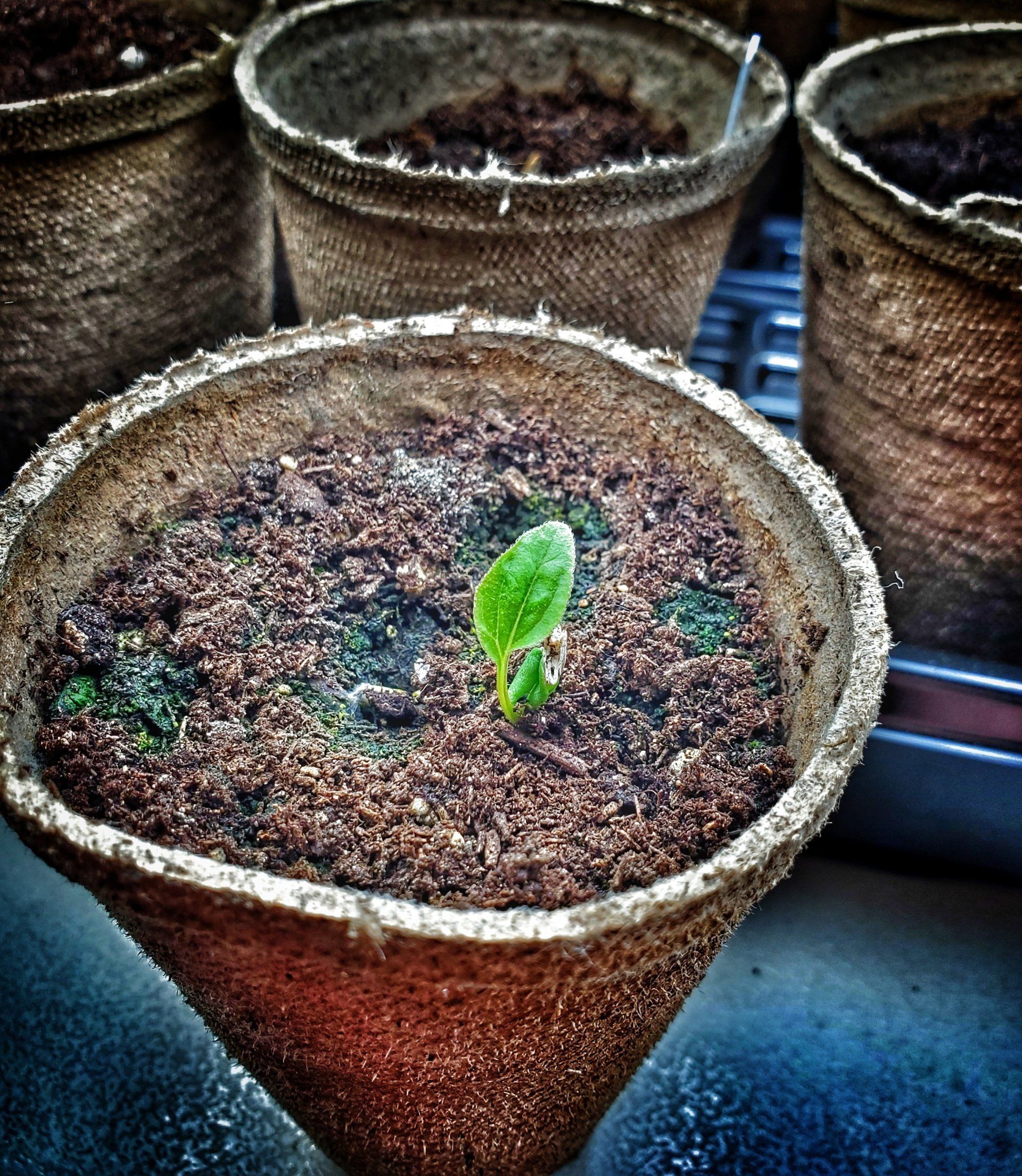
Slow and steady wins the race. This is the phrase that comes to mind when I think about starting certain plants, such as echinacea, from seed. It's a somewhat slower process than sweet peas, celosia, or some of our other favorites. However, just as with some of those great favorites of ours, it's worth it in the end. Besides, if you're like me, the process is part of the fun. As I've hinted, starting echinacea can be a bit of a process. The following is a bit of my experience in sprouting echinacea seeds. I've also added a few tips if you plan to try your hand at it as well. First, lets talk about stratification . The word itself sounds sort of fancy and scientific, doesn't it? But what is it? Well, like many seeds, echinacea seeds like a period of stratification. In nature, this is the period in which the seed experiences winter. This period of cold helps to soften the seed's outer shell and trigger development of the embryonic seedling. Now, there are quite a few methods out there to offer your seeds a period of stratification, and I hope to try a few more of them in the coming years. However, one simple method for us is to refrigerate our seed packets for a few weeks (sometimes months) until we're ready to plant. Essentially, the refrigerator becomes a space for cold storage. Then, when we are ready, we sow them in seedling trays, peat pots, or whatever medium we'll be using (covered with about 1/4" of seedling mix). They are then set in a cool location (45 - 55 degrees) to await sprouting. So, before you ask, let me answer a common question. No, I don't freeze our echinacea seeds before they are planted. Instead, the method above offers them a period of natural-ish stratification that softens their shells and wakes them up. Even moisture is important. Some seeds only need dry stratification, others like moist stratification. Echinacea seems to benefit from the latter - at least in our experience. Lastly, before we cover some quick tips, a quick note about moisture. As mentioned, echinacea benefits from moist stratification. The cold helps trigger the "waking" process of the seed. It also plays a part in softening or even cracking the seed coat to allow the seedling to emerge. However, in echinacea, another very important part of that softening process is moisture. This is why it is essential to keep the potting medium around the seed evenly moist - not wet. This can be done with humidity domes, plastic wrap, or careful bottom watering. We check ours every few days to keep track of their overall condition. A couple of quick tips: Don't have a room that stays cool enough to offer stratification? Do you have space in your refrigerator? Even temps in the upper 30's to low 40's will do. Just make sure to cover them so they don't dry out too much. After a few weeks, or if you see sprouting, try moving them out of the fridge and to another cool location (60-ish) where you can give them adequate light. So you've planted all your seeds and they haven't germinated yet? Don't worry. Wait. Echinacea tends to be slow to germinate. I've seen seed sprout up to 30 days later. The keys seems to be: 1) stratification, 2) even moisture, and 3) patience. Slow and steady wins the race.

Let me introduce myself. My name is Chris, and you might say that I am 1/2 of Shepherd’s Gate Flower Farm (with my wife, Melissa, being the other half). Shepherd’s Gate is the longtime dream of both my wife and I. It's even the blending of two skill sets - mine being horticulture. You see, my earliest memories include gardening. I remember planting marigolds and impatiens with my mom at just 3 years old. I remember running around the grounds of a family nursery, hiding under flower tables and climbing on tall piles of bagged soils. I remember my grandmother's surprise (and later frustration) as I discovered how to transplant flowers and perennials and would relocate plants all over her garden. I even remember garden after garden that I’d tend well into my teen years. Later, I began studying horticulture and began working at various nurseries. I started by simply watering plants and quickly moved to become a hardgoods buyer and then color (flower) buyer. With a strong interest in propagation and flowerscaping, I later managed a couple of greenhouses and landscape crews. I even tried my hand professionally for a time in the indoor garden arena, tending various houseplants and orchids (the latter of which became a bit of an addiction for a time). Of late, I’ve become a pragmatic proponent of regenerative agriculture - a philosophy which we regularly contemplate when making farm decisions and love to talk about while giving tours. With a certificate in horticulture, many years of related experience, and a passion for the art and science of growing plants, I have become the boots and gloves of Shepherd’s Gate Flower Farm - in charge of all things field and flower related. However, that’s not all. I’m also a huge proponent of learning. I have a masters degree in education, and I hope to be a source of information for customers and kindred gardening enthusiasts alike. Combine that with my love for writing... and... well, here you have it: a blog! It is my hope that this is just the start of a long and fruitful relationship. My best to you and yours! Chris Kane SGFF Praediculturist
